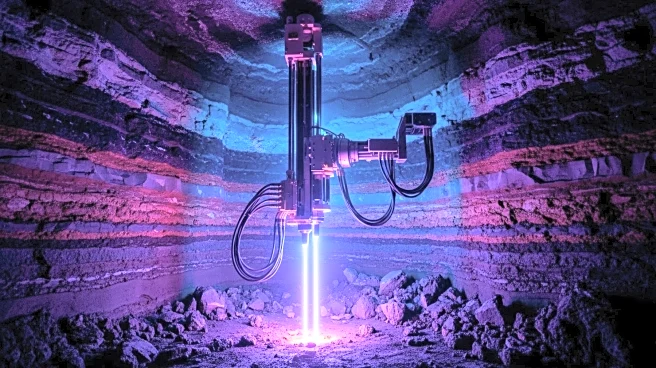What is the story about?
What's Happening?
Quaise Energy has successfully completed field trials in Texas using its microwave drilling system, powered by a Gyrotron, to drill through solid rock. This technology aims to access deep geothermal energy, which involves drilling several miles below the Earth's surface to reach hot water or rock. The Gyrotron, initially used in fusion research, superheats plasma to facilitate drilling. This advancement could lead to the development of deep geothermal power plants, offering a significant increase in power output compared to traditional geothermal methods. Quaise plans to pilot a plant in Oregon by 2028, in partnership with Nabors, highlighting the potential for geothermal energy to compete with fossil fuels economically while reducing carbon emissions.
Why It's Important?
The development of deep geothermal energy has the potential to transform the global energy landscape by providing a clean, reliable, and cost-effective alternative to fossil fuels. This technology could significantly reduce carbon emissions and help decarbonize industries such as mining. By drilling deeper, geothermal wells can be established in more locations, increasing accessibility and energy production. The economic benefits include lower operational costs and higher power density, making it a competitive option against traditional energy sources. This advancement supports the transition to renewable energy and aligns with global efforts to combat climate change.
What's Next?
Quaise Energy plans to continue its development of deep geothermal technology, with a pilot plant expected in Oregon by 2028. The partnership with Nabors indicates a strategic move to expand geothermal energy capabilities. As the technology progresses, it may attract more investment and interest from industries seeking sustainable energy solutions. The success of these initiatives could lead to broader adoption of geothermal energy, influencing energy policies and market dynamics. Stakeholders, including energy companies and environmental groups, will likely monitor these developments closely.
Beyond the Headlines
The use of plasma drilling technology raises questions about the long-term environmental impact and sustainability of deep geothermal energy. While it offers a cleaner alternative to fossil fuels, the drilling process itself must be managed to minimize ecological disruption. Additionally, the integration of this technology into existing energy infrastructures will require careful planning and investment. The ethical implications of transitioning to renewable energy sources also involve considerations of energy equity and access, ensuring that the benefits of clean energy are distributed fairly across different communities.

















